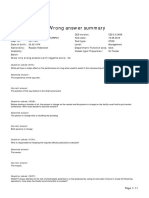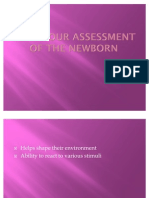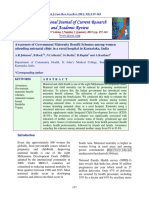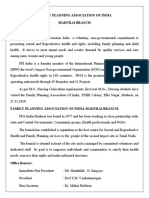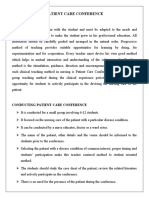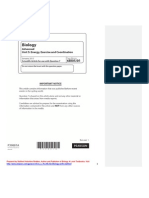SNC
SNC
Uploaded by
ValarmathiCopyright:
Available Formats
SNC
SNC
Uploaded by
ValarmathiOriginal Description:
Copyright
Available Formats
Share this document
Did you find this document useful?
Is this content inappropriate?
Copyright:
Available Formats
SNC
SNC
Uploaded by
ValarmathiCopyright:
Available Formats
Welcome to Tamil Nadu Nurses and Midwives Council
The Tamil Nadu Nurses and Midwives Council is the premier Nursing Council in
the whole of South-East Asia established in 1926. This Council is an Autonomous Statutory
Registration Body for the Nurses, Midwives, Auxiliary Nurse Midwives / Multipurpose
Health Workers / Health Visitors.
Preamble:
The Tamil Nadu Nurses and Midwives Council is an Autonomous Statutory
Registration Body for registering qualified Nurses, Midwives, Auxiliary Nurse Midwives/
Multipurpose Health Workers/ Health Visitors as per the provision in the Act.
The Madras Nurses and Midwives Act No.III of 1926 was passed in the Madras
Legislative Council of Madras in 1926 followed by Notification in the Fort St. George
Gazette on 29th June 1926 and came into force on 14th February 1928.
The Madras Nurses and Midwives Council was constituted under the authority of the above
Act by a notification by the Governor on 14th December 1928. This Council is the earliest
piece of Legislation on Nursing in the whole of South-East Asia aiming at the advancement
of Nursing Education and champion the cause of the nursing profession.
"The Madras Nurses and Midwives Act No.III of 1926" was renamed as the "Tamilnadu
Nurses and Midwives (Amendment) Act No.XXVI" of 1960 on 14th December 1960.
The rules and regulations framed thereunder have been amended on several occasions to suit
the rapid changes in science and technologies.
History:
HISTORY OF TAMILNADU NURSES AND MIDWIVES COUNCIL
FROM INCEPTION (1928)
A vital legislation for control of Nurses, Midwives and Dhais who were carrying on
unlicensed practice of their profession in the Presidency of Madras was introduced in the
Madras Legislative Assembly in 1926 and passed as Act III of 1926. It may reasonably be
thought that this legislation could have been passed 14 years earlier when the Medical
Registration Act of 1914 was passed. However, it is the first of its kind in India and Madras
can take pride in the fact that it is the premier. Presidency of India to get the enviable honour
of having a Statutory Council entrusted with the task of opening the First Register's of Nurses
and Midwives and admitting thereto trained and untrained persons practicing their profession
as Nurses and/or as Midwives in the Madras Presidency.
The term Presidency then connected the composite Madras State which included the
present States of Tamilnadu, Andhrapradesh and Kerala (excluding the Indian State of
Travancore and Cochin) As provided in Sub-section (1) of Section 1 of the Act, A Council
called the Madras Nurses and Midwives Council was then formed. The Assent of the British
Government, a vital legislation for regulating the Nursing training and practice was passed by
the Legislature was made on 7th May 1926 and signed by the Governor General on the 9th
June 1926. The same was published in Fort St. George Gazette on the 29th June 1926. The
Madras Nurses and Midwives Act III of 1926 came into force on the 14th day of February
1928.
It is called the Madras Nurses and Midwives Act III of 1926. It was amended as per
Nurses and Midwives Act VII of 1934 and Act XXVI(26) of 1960. This Council is an
autonomous statutory registration body for registering qualified Nurses, Midwives,
Auxiliary-Nurse-Midwives /Multipurpose Health Workers / Health Visitors as per the
provisions of the Act. It extends its registration to Union Territories ie: Pondicherry and
Andaman & Nicobar Islands. The syllabus for the training of nurses was revised in 1927 by
adopting the syllabus prescribed by the General Nursing Council for England and Wales,
London in a modified form.
This council is the earliest piece of legislation on Nursing in the whole of South-East
Asia. The first meeting of the Council was held on 11th April, 1928 under the presidentship
of Maj.Gen.F.H.G. Hutchinson, I.M.S., the Surgeon-General with the Government of
Madras. The second meeting of the Council held on 20-03-1929 gave recognition to nine
hospitals as training institutions for nurses, four hospitals for midwives and 35 hospitals for
dhais. The first Register of Nurses, Midwives and Dhais was compiled and printed and
published in 1930. A Registrar was also appointed to carry out the functions of the Council
and to implement its decisions.
Current Involvement
Computerization of all the Council data from the inception
Upgrade the Software to expedite the function of the council
RN, RM Certificates are issued within an hour
Development of Nurses Data Bank to maintain the Live Registry
Renewal of licensure from July 1st 2013 onwards only through Online
TNNMC Journals on 6 specialties biannually released
Introduction of CNE – Online/Regular
Faculty Management Software Development
Institution Management Software Development
Nurses Research Archive
There are six levels of nursing education in India today. They are :
1) Multy Purpose Health Worker Female training (ANM or MPHW-F)
2) Female Health Supervisor training (HV or MPHS-F)
3) General Nursing and Midwifery (GNM)
4) BSc. Nursing
5) MSc. Nursing
6) MPhil and PhD
The ANM, HV, and GNM are conducted in schools of nursing. The last 3 are
university level courses and the respective universities conduct examinations. Beside there
are several certificate and diploma courses in specialties.
Nursing education has expanded considerably post independence. University
education in nursing brought about changes in nursing education. The type of nurses required
today is an "all round personality". Education brings changes in behaviour of the individual
in a desirable manner. It aims at all round development of an individual to become mature,
self-sufficient, intellectually, culturally refined, socially efficient and spiritually advanced.
PRESIDENT: Dr. A. Chandranathan
REGISTRAR:
PROF. DR. (Mrs.) S. ANI GRACE KALAIMATHI ( FAC )
Functions of The Council
As Per The Act
This Council is an Autonomous Statutory Registration Body for registering qualified
Nurses, Midwives, Auxiliary-Nurse-Midwives/Multipurpose Health workers/ Health visitors
as per the provisions of the Act. It extends its registration to Union Territories ie: Pondicherry
and Andaman and Nicobar Islands.
Nurses and Midwives Act VII of 1934 and Act XXVI(26) of 1960, till today we follow the
same.
Recognition of Nursing Institutions as per the Act.
Registration of qualified Nursing Professionals mentioned above and maintenance of
State Register for the purpose
Development of inter linkages and reciprocities with corresponding Councils in other
States of India.
Monitoring of professional ethics.
Regulation and surveillance of professional conduct and take action against practice of their
professional by quacks and check malpractice.
Contact Us
Tamilnadu Nurses & Midwives Council,
Jayaprakash Narayanan Maligai,
Old No.140, New No.56,
Santhome High Road (Near Santhome Church),
Mylapore, Chennai - 600 004. Tamil Nadu,
INDIA.
Phone: 91-44-2493 4792, 91-44-4047 3330
Telefax: 91-44-24620547
E-Mail: info@tamilnadunursingcouncil.com
Types of Registration
Tamilnadu Candidates (Primary)
Tamilnadu Candidate’s (Primary) Additional Qualification
Other State Candidates (Secondary)
Other State Candidate’s (Secondary) Additional Qualification
Duplicate Certificate
Change of Name
Requirement for Registration
General Instructions
Diploma in Auxiliary Nurse Midwife / Multipurpose Health Worker (MPHW/ANM)
Health Visitor / Multipurpose Health Supervisor(F) (HV)
Diploma in General Nursing and Midwifery (DGNM)
Basic B.Sc., Nursing (B.SC(N))
M.Sc., Nursing (M.SC(N))
Post Basic B.Sc., Nursing (P.B.B.SC(N))
Post Basic Diploma in Nursing Specialities (P.B.D.N)
Issue of “No Objection Certificate” (NOC)
Registration time: 10.00 AM TO 1.00 PM from Monday to Friday
Career Guidance
Career options in Nursing
Prof.Dr.S.Ani Grace Kalaimathi M.Sc(N), PhD., Registrar(FAC), Tamilnadu
Nurses and Midwives Council
A career in nursing means no two days are ever the same. They're exciting,
stimulating and diverse offering a variety of environments and areas in which to specialise.
Better still, each day that passes presents the opportunity to develop new skills, take on
further responsibilities and build your career, whether it's here or overseas. Nursing is a
dynamic and varied career choice. As well as being a respected profession for both men and
women, with numerous rewards and opportunities, every day is exciting and unpredictable.
While every nursing career is different to another, the one thing that all nurses have in
common is that their work is never dull. Working in the health care environment is more than
a job - it's a career. A career where you can make a difference, all day, every day.
Career Paths
Individual nursing practice is determined by the career path selected and is dependent upon
education, experience, work setting and geographical location.
Clinical Nurse
Clinical Nurse - Provides scientific, psychological, and technological knowledge in the care
of patients and families in many health care settings.
Nurse Educator
Utilizes educational methodologies to present current information in patient care settings,
universities, and communities
Nurse Administrator
Coordinates the use of human, financial, and technological resources to provide patient care.
Nurse Researcher
Utilizes statistical methodologies to discover or establish facts, principles or relationships to
improve the quality of nursing.
Career Diversity
Nurses may follow their personal and professional interests by working with any group of
people, in any setting, at any time. There is no profession which offers as many opportunities
for diversified roles as does nursing.
Hospital Settings
Critical Care
Emergency
Maternal/Child Care
Medical: Cardiology, Diabetes, Gastroenterology, Gerontology, Nephrology,
Neurology,
Oncology, Pulmonary, Rehabilitation, Renal, Rheumatology, Urology
Operating Room/Recovery Room
Pediatrics
Psychiatric/Mental Health
Surgical: Burn, Cardiovascular, Ear/Nose/Throat, Gastroenterology, Orthopedics,
Plastic Reconstructive, Transplant
Non-hospital Settings
Public/Community Health
Mental Health Agencies
Home Health Care
Health Maintenance Organizations
Managed Care Companies
Insurance
Occupational Health
Research Centers
Extended Care Facilities
Clinics
Outpatient Surgery Centers
Hospices
Community Schools, Day Care Centers
Military Branches
Independent Practice
Schools/Colleges of Nursing
Old age Homes
Job Outlook:
The future looks bright in the nursing field. The outlook for new Registered Nurses is
exceptionally good; the number of new jobs for registered nurses is expected to increase at a
rate far greater than that of most other jobs in coming years. Healthcare in India is estimated
to have a 40-50 percent shortage of nurses. An important profession within medicine, nursing
supports patients with critical illnesses, chronic diseases and psychiatric illnesses in public
and private settings. Within a hospital or non-hospital setting, nurses are crucial to the
healthcare industry.
COLLEGE OF NURSING
MADURAI MEDICAL COLLEGE
MADURAI- 20.
NURSING EDUCATION
ASSIGNMENT
ON
Field trip
SUBMITTED TO:
Miss.A.SHANTHI M.SC(N)
READER ,CON,MMC,MADURAI
MRS.N.MAHESWARI M.SC(N)
FACULTY IN NURSING
MRS.N.RAJALAKSHMI M.SC(N) SUBMITTED BY
FACULTY IN NURSING P.VALARMATHI
COLLEGE OF NURSING I YEAR M.SC (N)
MMC, MADURAI-20
You might also like
- John Deere F510 and F525 User ManualDocument396 pagesJohn Deere F510 and F525 User ManualDávid Németh100% (1)
- M.SC EvaluationDocument215 pagesM.SC EvaluationShivani Tiwari100% (1)
- 3.anaesthesia and Analgesia in ObstetricsDocument7 pages3.anaesthesia and Analgesia in ObstetricsVeena Dalmeida100% (2)
- Plan Recruitment Process For Nursing Personnel in HospitalDocument20 pagesPlan Recruitment Process For Nursing Personnel in HospitalValarmathi100% (3)
- Patterns of Nursing EducationDocument34 pagesPatterns of Nursing EducationIze C Viji94% (18)
- Collaboration Issues and Models - Within and Outside Nursing)Document14 pagesCollaboration Issues and Models - Within and Outside Nursing)madhurima kundu50% (10)
- Concept of Faculty Supervisor (Dual) Position: SupervisionDocument6 pagesConcept of Faculty Supervisor (Dual) Position: SupervisionAru Verma100% (3)
- ASSIGNMENT On Nursing RoundsDocument6 pagesASSIGNMENT On Nursing RoundsValarmathi100% (3)
- Seminar: Origins of The WordDocument9 pagesSeminar: Origins of The WordValarmathi0% (2)
- ASSIGNMENT On Nursing RoundsDocument6 pagesASSIGNMENT On Nursing RoundsValarmathi100% (3)
- 11.1 Indian Nursing CouncilDocument14 pages11.1 Indian Nursing CouncilValarmathi83% (6)
- 2-Bed Side ClinicDocument8 pages2-Bed Side ClinicValarmathiNo ratings yet
- Wrong Answer SummaryDocument11 pagesWrong Answer SummaryJezrell JaravataNo ratings yet
- Role of Inc, SRNC, BoardsDocument37 pagesRole of Inc, SRNC, BoardsPruthvi100% (1)
- Role of Regulatoy/Statutory Bodies in Nursing: Ishrat A. Patel 1 Year MSC NursingDocument31 pagesRole of Regulatoy/Statutory Bodies in Nursing: Ishrat A. Patel 1 Year MSC NursingIshrat PatelNo ratings yet
- Dvance Ursing Ractice: Seminar ON Professional Organizations, Unions and Self DefenceDocument19 pagesDvance Ursing Ractice: Seminar ON Professional Organizations, Unions and Self DefenceValarmathiNo ratings yet
- Dissertation Submitted To: The Tamil Nadu Dr.M.G.R.Medical UniversityDocument13 pagesDissertation Submitted To: The Tamil Nadu Dr.M.G.R.Medical UniversityHenry Manuel PrinceNo ratings yet
- Evaluation of Educational Programs in Nursing Course and Program V1Document13 pagesEvaluation of Educational Programs in Nursing Course and Program V1Stephina ImmaculateNo ratings yet
- Master of Philosophy Programme in NursingDocument17 pagesMaster of Philosophy Programme in NursingSanjay Kumar SanjuNo ratings yet
- Patient Care ConferenceDocument3 pagesPatient Care ConferenceValarmathi0% (1)
- Correlation of Theory and PracticeDocument30 pagesCorrelation of Theory and PracticeSathish Rajamani0% (1)
- AIMS and Domain OF EDUCATION STDNTDocument49 pagesAIMS and Domain OF EDUCATION STDNTsona100% (2)
- Post Basic Diploma Courses: Rajkumari Amrit Kaur College of NursingDocument13 pagesPost Basic Diploma Courses: Rajkumari Amrit Kaur College of NursingMallika JoonNo ratings yet
- Material Management - IndentingDocument8 pagesMaterial Management - IndentingshivaguruNo ratings yet
- Role of Professional Associations and Unions GauriDocument18 pagesRole of Professional Associations and Unions GauriBisakha DeyNo ratings yet
- Cne Seminar PDFDocument58 pagesCne Seminar PDFJoseph John CrastoNo ratings yet
- Visit To PSG College of Nursing: Submitted To Submitted byDocument8 pagesVisit To PSG College of Nursing: Submitted To Submitted byShubha JeniferNo ratings yet
- A Synopsis: Master of Science in NursingDocument19 pagesA Synopsis: Master of Science in NursingKavi rajput100% (1)
- Nightingale Institute of Nursing: Assignment ON An Annotated BibliographyDocument13 pagesNightingale Institute of Nursing: Assignment ON An Annotated BibliographyDhAiRyA ArOrANo ratings yet
- Role of Indian Nursing CouncilDocument7 pagesRole of Indian Nursing CouncilNithiya Nadesan100% (2)
- Critical Evaluation of Nursing InstitutionDocument16 pagesCritical Evaluation of Nursing InstitutionRaman KhatriNo ratings yet
- Assignment Onsetting of Labor RoomDocument8 pagesAssignment Onsetting of Labor RoomPriyaNo ratings yet
- Knowledge and Attitude Regarding Human Milk Banking Among Postnatal Mothers in Selected HospitalsDocument5 pagesKnowledge and Attitude Regarding Human Milk Banking Among Postnatal Mothers in Selected HospitalsRana VandanaNo ratings yet
- Management of Nursing Educational InstitutionsDocument61 pagesManagement of Nursing Educational Institutionspriya manesh100% (1)
- Nursing Education in IndiaDocument11 pagesNursing Education in Indiamanglam100% (1)
- COLLABORATION ISSUES AND MOLDELS-WITHIN AND OUTSIDE NURSING Last PartDocument6 pagesCOLLABORATION ISSUES AND MOLDELS-WITHIN AND OUTSIDE NURSING Last PartAxsa AlexNo ratings yet
- Health Education BureauDocument13 pagesHealth Education Bureauv_vijayakanth7656No ratings yet
- Journal Club PresentationDocument15 pagesJournal Club PresentationAGERI PUSHPALATHANo ratings yet
- Microteaching OsceDocument6 pagesMicroteaching OsceValarmathiNo ratings yet
- Anp PDFDocument27 pagesAnp PDFAngelin KanimozhiNo ratings yet
- Annotated Bibliography of Obstretics & GynaecologyDocument4 pagesAnnotated Bibliography of Obstretics & GynaecologyKaku ManishaNo ratings yet
- Assignment On Continuing Nursing EducationDocument16 pagesAssignment On Continuing Nursing Educationsumitgupta2391No ratings yet
- Behaviour Assessment of The NewbornDocument21 pagesBehaviour Assessment of The Newbornkirangill_12No ratings yet
- RGUHS PHD Nursing CriteriaDocument20 pagesRGUHS PHD Nursing CriteriaRabiu Hassan Musa100% (1)
- Independent Practice Issues and Independent Midwifery Nursing PRACTIONERDocument14 pagesIndependent Practice Issues and Independent Midwifery Nursing PRACTIONERKrini Tandel100% (4)
- Developing A System For Maintaining ConfidentialityDocument21 pagesDeveloping A System For Maintaining ConfidentialitySanjeeta Bhagat0% (1)
- Scope of Nursing in IndiaDocument4 pagesScope of Nursing in IndiaJaykumar MirajkarNo ratings yet
- Question BankDocument4 pagesQuestion BankKavita kumariNo ratings yet
- Management of Nursing Educational Institution: IntroductionDocument9 pagesManagement of Nursing Educational Institution: IntroductionTwinkle100% (1)
- AC Code of EthisDocument61 pagesAC Code of EthisAnuchithra RadhakrishnanNo ratings yet
- Assignment ON: Developing and Presenting A Research ProposalDocument8 pagesAssignment ON: Developing and Presenting A Research ProposalAru VermaNo ratings yet
- Collective BargainingDocument16 pagesCollective BargainingPankaj Jena100% (1)
- International Confederation of MidwivesDocument36 pagesInternational Confederation of MidwivesElisha JoshiNo ratings yet
- Annotated Bibliography of Research & StatisticsDocument4 pagesAnnotated Bibliography of Research & StatisticsKaku ManishaNo ratings yet
- Health Care Deliver System in IndiaDocument13 pagesHealth Care Deliver System in IndiaRinkal UpadhyayNo ratings yet
- Nursing Education in IndiaDocument34 pagesNursing Education in Indiacitidotnet88% (34)
- Development and Maintenance of Standards and Accreditation ofDocument6 pagesDevelopment and Maintenance of Standards and Accreditation ofsrimalathiNo ratings yet
- Differential ScaleDocument5 pagesDifferential ScaleGayatri Mudliyar100% (2)
- Nursing EducationDocument6 pagesNursing Educationpandem soniya100% (1)
- Philosophy of Nursing CollegeDocument4 pagesPhilosophy of Nursing CollegeDelphy Varghese67% (3)
- Physical Ability and Disability AssessmentDocument4 pagesPhysical Ability and Disability AssessmentPriya100% (1)
- Independent Nurse PractitionerDocument14 pagesIndependent Nurse PractitionerKarishma Shroff100% (2)
- Public Relations Nursing EducationDocument77 pagesPublic Relations Nursing EducationKalla Daniel SharonNo ratings yet
- Problem Statement DocsDocument2 pagesProblem Statement DocsharpreetNo ratings yet
- Effectiveness of Structured Teaching Programme On Knowledge Regarding The Breast Engorgement Among Postnatal Mother With Breast EngorgementDocument2 pagesEffectiveness of Structured Teaching Programme On Knowledge Regarding The Breast Engorgement Among Postnatal Mother With Breast EngorgementIJAR JOURNALNo ratings yet
- PROFESSIONAL ORGANIZATION NursingDocument37 pagesPROFESSIONAL ORGANIZATION NursingTrupti AghamakarNo ratings yet
- Nursing Regulatory MechanismDocument26 pagesNursing Regulatory MechanismPema ChuklaNo ratings yet
- Regulatory Bodies / Apex BodiesDocument6 pagesRegulatory Bodies / Apex Bodiesavinash dhameriyaNo ratings yet
- Recruitment Retention and Attrition of Nursing Staff and Its Effect On Turnover - Case Study of Shree Hospital Rashmi DwivediDocument210 pagesRecruitment Retention and Attrition of Nursing Staff and Its Effect On Turnover - Case Study of Shree Hospital Rashmi DwivediValarmathiNo ratings yet
- Impact of COVID-19 Pandemic in Public Mental Health: An Extensive Narrative ReviewDocument21 pagesImpact of COVID-19 Pandemic in Public Mental Health: An Extensive Narrative ReviewValarmathiNo ratings yet
- 302340KWDocument22 pages302340KWValarmathiNo ratings yet
- A.R.Johnson, Et AlDocument7 pagesA.R.Johnson, Et AlValarmathi0% (1)
- 11.3 MGR UniversityDocument15 pages11.3 MGR UniversityValarmathiNo ratings yet
- 3.2 Recruitment Educational InstitutionDocument19 pages3.2 Recruitment Educational InstitutionValarmathiNo ratings yet
- Family Planning Association of India Madurai BranchDocument12 pagesFamily Planning Association of India Madurai BranchValarmathiNo ratings yet
- Anatomy of Female ReproDocument16 pagesAnatomy of Female ReproValarmathiNo ratings yet
- Decision Making-Decentralization Basic Goals of DecentralizationDocument18 pagesDecision Making-Decentralization Basic Goals of DecentralizationValarmathiNo ratings yet
- Sri Ramachandra University SRMC & Ri Department OF Obstetrics AND Gynaecology List OF Equipments AND Instruments (AS PER Mci)Document6 pagesSri Ramachandra University SRMC & Ri Department OF Obstetrics AND Gynaecology List OF Equipments AND Instruments (AS PER Mci)ValarmathiNo ratings yet
- Patient Care ConferenceDocument3 pagesPatient Care ConferenceValarmathi0% (1)
- Role Play 1Document13 pagesRole Play 1ValarmathiNo ratings yet
- SymposiumDocument10 pagesSymposiumValarmathi100% (1)
- DEMONSTRATIONGOWRIDocument6 pagesDEMONSTRATIONGOWRIValarmathi100% (2)
- Treatment For My Patient: Drug Dose Route Action Indication Side Effect Nurse's ResponsibilityDocument2 pagesTreatment For My Patient: Drug Dose Route Action Indication Side Effect Nurse's ResponsibilityValarmathiNo ratings yet
- Reflective JournalDocument9 pagesReflective JournalValarmathiNo ratings yet
- Patient Care ConferenceDocument3 pagesPatient Care ConferenceValarmathiNo ratings yet
- Disseminated Intravascular Coagulopathy Disseminated Intravascular Coagulation (DIC) Is A PathologicalDocument6 pagesDisseminated Intravascular Coagulopathy Disseminated Intravascular Coagulation (DIC) Is A PathologicalValarmathiNo ratings yet
- Unit PlanDocument8 pagesUnit PlanValarmathi100% (3)
- Central ObjectiveDocument20 pagesCentral ObjectiveValarmathiNo ratings yet
- Lecture Method Introduction To Lecture MethodDocument11 pagesLecture Method Introduction To Lecture MethodValarmathiNo ratings yet
- Cardiac System AssessmentDocument14 pagesCardiac System AssessmentValarmathi100% (1)
- Essay Type ExaminationDocument11 pagesEssay Type ExaminationValarmathi83% (6)
- Objective Type TestDocument11 pagesObjective Type TestValarmathi100% (10)
- ET-233 Midterm Chapter 1 (From Board Past Papers)Document1 pageET-233 Midterm Chapter 1 (From Board Past Papers)HazoorAhmadNo ratings yet
- Multicenter Study of 342 Anorectal Malformation Patients - Age, Gender, Krickenbeck Subtypes, and Associated Anomalies.Document5 pagesMulticenter Study of 342 Anorectal Malformation Patients - Age, Gender, Krickenbeck Subtypes, and Associated Anomalies.NaeNo ratings yet
- Sewage Treatment: Chapter Three: Preliminary and Primary Wastewater Treatment Methods by Roman ADocument66 pagesSewage Treatment: Chapter Three: Preliminary and Primary Wastewater Treatment Methods by Roman Amarshet berhanNo ratings yet
- Randal W. Stoller To Head EurOrient Capital, The World's First Investment Bank Solely Dedicated To Mobilize Financing For Development and To Promote Socially Responsible Investing - Ron NechemiaDocument5 pagesRandal W. Stoller To Head EurOrient Capital, The World's First Investment Bank Solely Dedicated To Mobilize Financing For Development and To Promote Socially Responsible Investing - Ron NechemiaRon NechemiaNo ratings yet
- Assessment of Opd Patient's Satisfaction WithDocument6 pagesAssessment of Opd Patient's Satisfaction Withapouakone apouakoneNo ratings yet
- NCP DrainageDocument3 pagesNCP DrainageRuby GuarinNo ratings yet
- LEGASPI - Porter's AnalysisDocument1 pageLEGASPI - Porter's AnalysisErika Mae LegaspiNo ratings yet
- Review of Related LiteratureDocument2 pagesReview of Related LiteratureAnafe VillafuerteNo ratings yet
- Edexcel Scientific Article For Biology Unit 5 Paper Jan 2013Document24 pagesEdexcel Scientific Article For Biology Unit 5 Paper Jan 2013Stafford Valentine Redden100% (1)
- Energy Engineering Dept / 4Th Class (2015-2016) / Design of Energy SystemsDocument7 pagesEnergy Engineering Dept / 4Th Class (2015-2016) / Design of Energy SystemsUmed ADA-ALSATARNo ratings yet
- ANT Question BankDocument118 pagesANT Question BankWael BusharaNo ratings yet
- Bahasa Inggris 7Document65 pagesBahasa Inggris 7Treea TatiaNo ratings yet
- PJ - SMM - Nestle Cafe (Final)Document19 pagesPJ - SMM - Nestle Cafe (Final)Hooria KhanNo ratings yet
- Botony NotebookDocument23 pagesBotony NotebookparkeracadNo ratings yet
- "Chill Out": HX-P202 Instruction BookDocument114 pages"Chill Out": HX-P202 Instruction BookPam RojasNo ratings yet
- Project Management First Review: Installation of Solar Water Heater in VIT Mens HostelDocument6 pagesProject Management First Review: Installation of Solar Water Heater in VIT Mens HostelPrarabdhSaxenaNo ratings yet
- BuddyguylunchDocument2 pagesBuddyguylunchapi-280941659No ratings yet
- SUGBUsog in Schools Criteria Round 3Document5 pagesSUGBUsog in Schools Criteria Round 3Ang Kampilan100% (1)
- HSE Dashboard For Multiple SitessDocument11 pagesHSE Dashboard For Multiple SitessHanife M0% (1)
- School Nurse Job Duties, Responsibilities, and SettingsDocument3 pagesSchool Nurse Job Duties, Responsibilities, and SettingsJhey MalanyaonNo ratings yet
- DMC LZ3Document54 pagesDMC LZ3acselectronicaNo ratings yet
- Acute Respiratory InfectionsDocument18 pagesAcute Respiratory InfectionsEmilyRose17No ratings yet
- LG L226WA Service ManualDocument32 pagesLG L226WA Service Manualtristanleboss2100% (1)
- ଚିଫ୍ ଇଂଜିନିୟର୍ ଏବଂ ଯନ୍ତ୍ରୀ ମୁଖ୍ୟ - ଇଂଜିନିୟରିଂ କ୍ୟାଡରDocument1 pageଚିଫ୍ ଇଂଜିନିୟର୍ ଏବଂ ଯନ୍ତ୍ରୀ ମୁଖ୍ୟ - ଇଂଜିନିୟରିଂ କ୍ୟାଡରAkshay Kumar SahooNo ratings yet
- Electrowinning of Metals: Mineral Processing CourseDocument13 pagesElectrowinning of Metals: Mineral Processing CourseAdham ElbrawyNo ratings yet
- Invitation To Health Live It Now Brief Edition 9th Edition Dianne Hales Test BankDocument22 pagesInvitation To Health Live It Now Brief Edition 9th Edition Dianne Hales Test Bankcomplinofficialjasms100% (35)
- European Standard Norme Européenne Europäische NormDocument35 pagesEuropean Standard Norme Européenne Europäische NormVitor MachadoNo ratings yet
- Dellorto SHA Tuning Part 1 Moped ArmyDocument8 pagesDellorto SHA Tuning Part 1 Moped ArmydintoNo ratings yet











